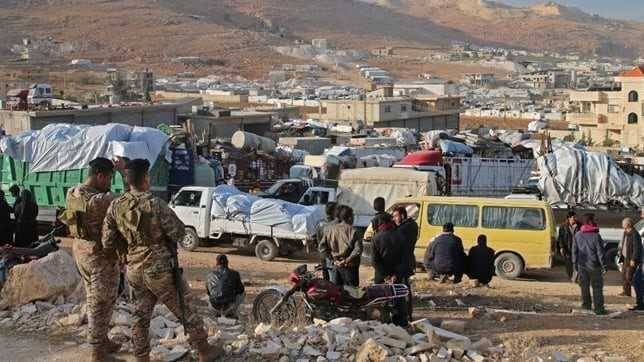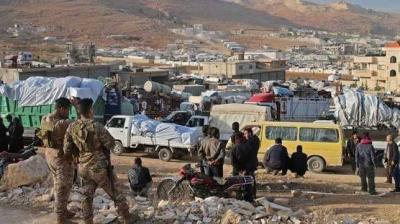The new Lebanese push for the return of Syrian displaced persons to their country, according to relevant officials, is based on a consensus that allows for dealing with the international community and the Syrian authorities with a unified Lebanese position this time. Previously, the positions of the parties, whether in power or outside it, were divided into conflicting directions, which dragged this sensitive file into the corridors of internal political disputes, sometimes taking on a racist character, and at other times characterized by populist overbidding. It became mired in the entanglements and complexities of the internal political crisis, which includes the position toward the Syrian regime as noted in "Nidaa Al-Watan."
Internal disagreements about the stance toward Damascus have imposed chaos and randomness in the way of dealing with the Syrian displacement into Lebanon since it began in late 2011, preventing the organization of their presence as happened in Jordan. The chaos and randomness escalated to the point of halting the registration of their numbers and locations, leading the state to face a data issue with the UN High Commissioner for Refugees, which is also incomplete. Recently, there has been a return to gathering data in some areas, similar to what the Lebanese Forces have done in the Bsharri area and its surroundings and what municipalities are achieving, but it still lacks comprehensiveness, whereas the Progressive Socialist Party has proposed a comprehensive census of Syrians in the country.
Despite some modest return steps organized by the General Directorate of General Security, and regardless of the realities of Lebanese disagreements that hindered serious engagement with the file, the issue has been stuck in recent years on two fundamental dilemmas:
1. The lack of enthusiasm from the Syrian regime to facilitate their return for several reasons, the most important of which are the economic financial reasons for housing most of them, as their homes are destroyed, while Damascus is experiencing its worst economic crisis. This is compounded by the regime's confiscation of the properties of many of them, especially those who supported the Syrian opposition. Although Syrian officials have indicated their readiness to welcome the displaced and claim that they could only be happy for their return, the implicit position, according to Lebanese officials eager to relieve their burden, was to link the receipt of funds and housing aid for reconstruction with their return. Some Lebanese ministers who visited Damascus for this purpose, expecting to discuss the issue officially, heard sweet words about readiness to receive the displaced. However, the Syrian leadership soon relayed to others the difficulty of undertaking this step. In recent days, the question of the regime's actual stance has remained open among those seriously working on the file.
2. The lack of enthusiasm from the European Union and the United States for their transfer to Syria as long as there are no guarantees for their safety, and as long as there is no political solution to the crisis due to the regime's refusal to implement provisions in UN Resolution 2254 related to political reforms. The regime was blamed for its failure to respond to political solutions to facilitate the return, a criticism shared by Russia and its Western adversaries. The Western rejection of their return has led to deteriorating relations between some Western countries and certain Lebanese factions classified as allies of resistance and insisting on their return, such as former President Michel Aoun and his political movement, especially since financing the return is subject to some requirements that incur penalties under the Caesar Act on those dealing with Bashar al-Assad.
Factors that are energizing the new emerging wave include developments in the security situation and the growing number of Syrians in prisons, as well as the involvement of groups in theft and smuggling crimes, some of which are protected in Lebanon and Syria. The latest incident involves the killing of the Lebanese Forces official Pascal Suleiman, whose investigation into his murder is still ongoing. The crime took on a political dimension immediately after it occurred, while his party awaits clarity on the facts to determine if there are political motivations behind it or simply theft.
A second factor is the uprising in Cyprus calling on the European Union for a different approach after being compelled by the influx of illegal displaced persons launching from Lebanon's shores to cancel any residence or work permits for them, which resulted in the visit of the Cypriot president and European Commission President Ursula von der Leyen to Beirut yesterday to discuss this crisis, in addition to the European assistance valued at one billion dollars over three years.
A third factor is Hezbollah's position. Previously, the party was in favor of association with its ally, the Free Patriotic Movement, and to alleviate the burden of their presence in its areas. Today, however, it is more enthusiastic as it feels that the ongoing demographic expansion of the displaced makes them, due to their poverty, fertile ground for recruitment by intelligence agencies, including Israel, to enlist them against the resistance, as seen in Israel's targeting of a Hamas official in the Chouf region weeks ago. The measure of how seriously the party is engaging with the new momentum will depend on its willingness to respond to controlling the land borders with Syria, which has led its need to keep them open to the return of those being deported and new arrivals aimed at illegal immigration. Some circles are questioning whether the party is showing enthusiasm for the new wave in order to exert influence over the Syrian regime due to recent disagreements with it following the Gaza war, according to "Nidaa Al-Watan."




